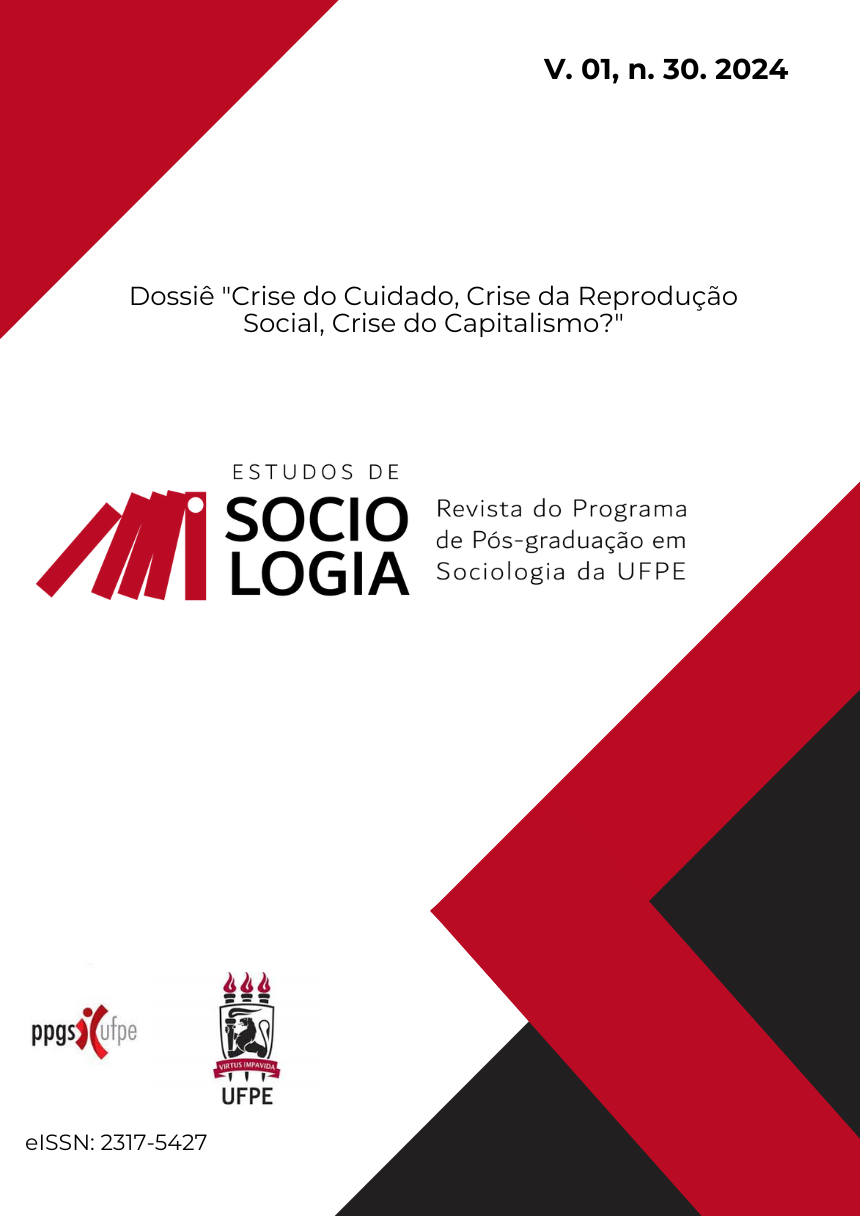social reproduction on the peripheries of global capitalism
DOI:
https://doi.org/10.51359/2317-5427.2024.261859Keywords:
social reproduction, peripherical social formations, informal labor, gender and racial division of laborAbstract
This article aims to discuss how social reproduction – which is responsible for maintaining capitalism – is different when analyzed in light of center-periphery relations in global capitalism. While the “housewife” model would have been predominant in advanced capitalist countries, in peripheral regions reproductive labor is distinct from this type of domestic worker. This point seems to be evident today as reproductive work in capitalist peripheries is carried out as precarious and informal jobs, mostly performed by racialized women. Since capitalism is a system of accumulation that expands itself, that had its origins in colonial times, reproductive labor in peripheral countries is not only a manifestation of this capitalist tendency, but it also displays a gender division of labor that is simultaneously a racial one.
References
ALVES, C.“Heroínas ou Servas do Capital?”: trabalho reprodutivo migrante e o controle social da força de trabalho de mulheres. 2019. 387 f. Tese (Doutorado em Ciências Jurídicas) – Faculdade de Ciências Jurídicas, Universidade Federal da Paraíba, João Pessoa, 2019.
AMARAL, M. F.; DRUCK, G.; FILGUEIRAS, L. O Conceito de informalidade: um exercício de aplicação empírica. Caderno CRH, Salvador, v. 17, n. 41, p. 211 -229, maio/ago. 2004.
AMIN, S. Accumulation on a World Scale. v. I e II. London: Monthly Review Press,1974.
ARAÚJO, A. Informalité et relations de genre. In: GEORGES, I.; LEITE, M. Les nouvelles configurations du travail et l'économie sociale et solidaire au Brésil. Paris: L'Harmattan, 2012.
ARRUZZA, C. Feminismo e Marxismo. Entre casamentos e divórcios. Lisboa: Editora Combate, 2010.
BAKKER, I; SILVEY, R. Beyond States and Markets: The challenges of social reproduction. New York: Routledge, 2008.
BARRERA, M. Race and class in the Southwest. Notre Dame: University of Notre Dame, 1979.
BENERÍA, L. Travail rémunéré, non rémunéré et mondialisation de la reproduction. In: Falquet, J; Hirata, H; Kergoat, D; Labari, B; Le Feuvre, N; Sow, F (org.). Le sexe de la mondialisation. Paris: SciencesPo, 2010.
BENNHOLDT‐THOMSEN, V. Subsistence production and extended reproduction. A contribution to the discussion about modes of production. The Journal of Peasant Studies, v. 9, n.4, p. 241-254, 1982.
BENNHOLDT‐THOMSEN, V.; VON WERLHOF, C.; MIES, M. Women: The Last Colony. London: Zed Books, 1988.
BENSTON, M. The political Economy of Women’s Liberation. Monthly Review, v. 21, n.4, p.13-27, set.1969.
BHATTACHARYA, T. How Not to Skip Class: Social Reproduction of Labor and the Global Working Class. In: BHATTACHARYA, T (org.). Social Reproduction Theory. London: Pluto Press, 2017a.
BHATTACHARYA, T. Introduction: Mapping Social Reproduction Theory. In: BHATTACHARYA, T (org.). Social Reproduction Theory. London: Pluto Press, 2017.
BRENNER, J; LASLETT, B. Gender and Social Reproduction: Historical Perspectives. Annual Review of Sociology, v. 15, p. 381-404, 1989.
CACCIAMALI, M.C. Globalização e processo de informalidade. Economia e Sociedade, Campinas, v. 14, p. 153-174, jun. 2000.
CASTILHO, M; MELO, H. Trabalho reprodutivo no Brasil: quem faz? Revista Economia contemporânea, Rio de Janeiro, v.13, n. 1, p.135-158, jan./abr. 2009 .
COULSON, et. al. “The Housewife and her Labour under Capitalism”: a Critique. In: MALOS, E. The politics of Household. London: Allison & Busby, 1980.
DEDECCA, C.; MENEZES, W. A Informalidade no mercado de trabalho brasileiro: Rendimentos e principais características. Nexos Econômicos, v. 6, n.2, p. 11–42, jan. 2012.
DELLA COSTA, M; JAMES, S. The Power of Women and the Subversion of the Community. London: Falling Wall Press, 1972.
FALQUET, J. Hommes en armes et femmes“de service”: tendances néolibérales dans l’évolution de la division sexuelle et internationale du travail. Cahiers du Genre, v. 1, n. 40, p. 15-37, 2006.
FEDERICI, S. O ponto Zero da Revolução. São Paulo: Editora Elefante, 2019.
FERGUSON, A. Women as a new Revolutionary class in the United States. In: WALKER, P. Between Labor and Capital. Boston: South End Press, 1979.
FERGUSON, A; MCNALLY, D. Capital, força de trabalho e relações de gênero. Revista Outubro, n. 29, p. 23-59, nov. 2017.
FRANK, G. Capitalism and Underdevelopment in Latin America: Historical Studies of Chile and Brazil. New York: Monthly Review Press, 1969.
GLENN, E. Racial Ethnic Women's Labor: The Intersection of Race, Gender and Class Oppression. Review of Radical Political Economics, v.17, n.3, p.88-108, 1985.
GLENN, E. From Servitude to Service Work: Historical Continuities in the Racial Division of Paid Reproductive Labor. Signs: Journal of Women in Culture and Society, vol.18, n.1, p.1-43, 1992.
GONZÁLEZ, L. Mulher Negra. In: LIMA, M; RIOS, F (org.). Por um feminismo afro-latino-americano. Rio de Janeiro, Zahar, 2020.
GUIMARÃES, N. The Circuits of Care: Refections from the Brazilian Case. In: GUIMARÃES, N; HIRATA, H. Care and Care Workers: A Latin America Perspective. Cham: Springer, 2021.
HALL, S. Race, Articulation and Societies structured in Dominance. In: UNESCO (org.) Sociological theories: Race and Colonialism. Paris: UNESCO, 1980.
HIRATA, H; KERGOAT, D. Atualidade da divisão sexual e centralidade do trabalho das mulheres. Política & Trabalho: Revista de Ciências Sociais, n. 53, p. 22-34, jun./dez. 2020.
HOPKINS, C. Mostly Work, Little Play: Social Reproduction, Migration and Paid Domestic Work in Montreal. In: BHATTACHARYA, T (org.). Social Reproduction Theory. London: Pluto Press, 2017.
MARX, K. Grundrisse. São Paulo: Boitempo, 2011.
MARX, K. O Capital: livro I. São Paulo: Boitempo, 2013.
MCNALLY, D. Intersections and Dialectics: Critical Reconstructions in Social Reproduction Theory. In: BHATTACHARYA, T (org.). Social Reproduction Theory. London: Pluto Press, 2017.
MIES, M. Patriarchy and Accumulation on a Global Scale. London: Zed Books, 1986.
MOHANDESI, S; TEITELMAN, E. Without Reserves. In: BHATTACHARYA, T (org.). Social Reproduction Theory. London: Pluto Press, 2017.
MONTICELLI, T. Cuidado e Poder: as relações do trabalho doméstico remunerado através da cultura doméstica. In: TAMANINI, M. et al. (org.) O cuidado em cena: desafios políticos, teóricos e práticos. Florianópolis: UDESC, 2018.
NOGUEIRA, T. A Cor das empregadas: desigualdades de gênero, raça e classe no cotidiano do trabalho doméstico remunerado do Rio de Janeiro. Orientadora: Moema de Castro Guedes. 2019. 89 f. Dissertação (Mestrado em Ciências Sociais) – Faculdade de Ciências Sociais, Universidade Federal Rural do Rio de Janeiro, Seropédica, 2019.
PLÁ, B. V. Dependency theory meets feminist economics: a research agenda. Third World Quarterly, dez. 2023, p. 1-18.
RAGO, M. Trabalho feminino e Sexualidade. In: DEL PRIORE, M. (org.) História das Mulheres no Brasil. 7. ed. São Paulo: Contexto, 2004.
RATTS, A; SILVA, A. A Mulher negra e o Trabalho doméstico nas Perspectivas de Lélia Gonzalez e Beatriz Nascimento. Revista da Casa da Geografia de Sobral, Sobral, v. 25, n.1, p. 189-207, 2023.
SACKS, C. B. Toward a Unified Theory of Class, Race, and Gender. American Ethnologist, V. 16, N. 3, p. 534-550, ago., 1989.
SAFFIOTI, H. Emprego doméstico e capitalismo. Petrópolis: Editora Vozes, 1978.
SECCOMBE, W. The Housewife and her Labour under Capitalism. London: IMG Publications, 1978.
SMITH, P. Domestic labour and Marx’s theory of value. In: KUHN, A; WOLPE, A. Feminism and Materialism. Women and modes pf production. London: Routledge and Kegan Paul, 1978.
VÁSCONEZ, A. Mujeres, hombres y las economías latinoamericanas: un análisis de dimensiones y políticas. In: ESQUIVEL, V. (org.). La economía feminista desde América Latina. Una hoja de ruta sobre los debates actuales en la región. Santo Domingo: ONU Mujeres, 2012.
VOGEL, L. Marxism and the Oppression of Women. Leiden: Brill, 2013.
WALLERSTEIN, I. The Modern World-system I. New York: Academic Press. 1974.
WALLERSTEIN, I. The Capitalist World-economy. New York: Cambridge University Press, 1991.
YOUNG, I. Beyond the unhappy marriage: a Critique of the dual systems theory. In: SARGENT, L. Women & Revolution. Montreal: Black Rose Books, 1981.
Published
Issue
Section
License
Copyright (c) 2024 Mirian Monteiro Kussumi

This work is licensed under a Creative Commons Attribution 4.0 International License.
Autores que publicam nesta revista concordam com os seguintes termos:- Autores mantém os direitos autorais e concedem à revista o direito de primeira publicação, com o trabalho simultaneamente licenciado sob a Licença Creative Commons Attribution que permite o compartilhamento do trabalho com reconhecimento da autoria e publicação inicial nesta revista.
- Autores têm autorização para assumir contratos adicionais separadamente, para distribuição não-exclusiva da versão do trabalho publicada nesta revista (ex.: publicar em repositório institucional ou como capítulo de livro), com reconhecimento de autoria e publicação inicial nesta revista.
- Autores têm permissão e são estimulados a publicar e distribuir seu trabalho online (ex.: em repositórios institucionais ou na sua página pessoal) a qualquer ponto antes ou durante o processo editorial, já que isso pode gerar alterações produtivas, bem como aumentar o impacto e a citação do trabalho publicado










